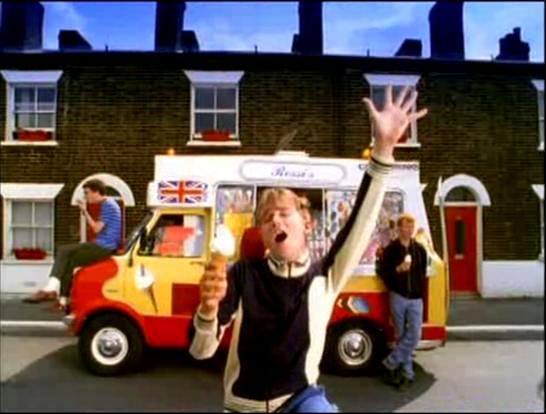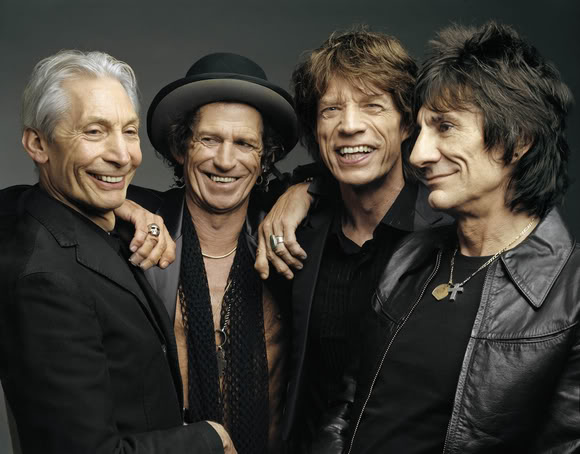
One of the things that most fascinates me about gig-watching is seeing the band dynamics right up there in front of you. You see all types: from the nervous, egg-shell anxiety of the other Nirvana members towards Kurt Cobain at Unplugged In New York; the primus inter pares status of Thom Yorke to Radiohead (I saw them during their tour for Amnesiac); the pseudo-democracy of Belle and Sebastian (with leader Stuart Murdoch as a self-effacing dictator); Paul Di’anno-era Iron Maiden very clearly has Steve Harris as the front man (bass guitar thrust at the audience like a machine gun) rather than the singer; Queen’s Olympian Live Aid performance draws not just on Freddy Mercury’s huge charisma, but also the band’s exceptional stage-craft honed across over fifteen years of intensive gigging; The Beatles’ famous rooftop gig is a dream for any student of body language, as Lennon and McCartney constantly turn to each other to sing (Macca being a southpaw, of course) while poor George looks on and Ringo hopes to keep up; hell, even with the League Of Gentlemen, Steve Pemberton comes across as very much the man in charge – no mean feat considering his colleagues are the sublime Mark Gattis (on whom I have rather a man-crush) and the spiky Reece Shearsmith. Closer to home, I once saw a very much beginner band with a talented guitarist with a cheeky smile that girls found intensely fuckable; the singer was much weaker, and it was odd but very obvious how much he draw confidence and strength from the guitarist. You could see him literally extracting it from the guitarist.
The most enthralling live performance I’ve ever seen is and remains Guns N’ Roses’ Live At The New York Ritz. Recorded in February 1988, it was performed eight months after the release of Appetite For Destruction but before it had set the world alight – it’s sometimes forgotten that it took a year to catch fire, with early single ‘Welcome To The Jungle’ not attracting much attention and ‘Sweet Child O’ Mine’ being released twice when its first release was similarly lackluster. Guns at this stage were therefore still “hungry tigers” – a phrase from my wife when I showed her the DVD of this gig, which I think was brilliantly apposite. They were lean, ferociously hungry for success and absolutely on fire.

The stage chemistry and presence of the band is magnificent. Axl naturally dominates, but without overly-overshadowing the others: his raw charisma is utterly compelling, his red hair, sharp cheek bones and not-an-ounce-of-fat frame mean you can’t take your eyes off him; there’s something smoldering, some risk always possible. (Like when he falls/jumps off the stage – I’ve never quite figured out which it is). At the start of the show, in his snakeskin jacket, swaying hips and mirrored-sunglasses, he is the very definition of young male arrogance. Slash, by contrast, is the faceless demon, the dark monster of rock. His face is concealed by his hair but somehow a cigarette still props out of his mouth, and he doesn’t just play that guitar (naturally a Les Paul Gibson), it’s like he is hard rock itself. Steven Adler on drums beats the skins and cymbals with glorious emphasis, pounding them like his life depends on it (and to time!). And when Guns are rocking hard, as in the end of “Paradise City” or when the verse kicks in on “Welcome To The Jungle”, he’s a pulsating blizzard of hair, drumsticks, arms and leather. Izzy interestingly eschews the leather look of the others for a white shirt and waistcoat, and he’s also the least active member on stage. His riffs propel the whole gig, though: when Slash is soloing you realize how essential Izzy is to the Guns sound. (His departure in 1991 was the end of Guns as a great band: Slash might be more exotic and is a stunning soloist, but Izzy was the heart and soul of the band, the riff, the Keith Richards). And in Duff, tall and lean and blonde, with that Sid Vicious-style chokechain-and-padlock, there was the punk presence in GN’R. But as a bassist he is terrific, constantly outlining the melody (as in the intro to “Sweet Child O’ Mine” or to the riff of “My Michelle”): he’s no dum-dum-dum-dum average punk bassist. (Can you think of a memorable bass line on a great punk tune? Nope, me neither). Every band member feels essential: there’s no Dave Rowantree (the Blur drummer) or Jason Newsted slightly left out. It helps that the Ritz is fairly small: I think it held (holds?) about 2000 people, so it has that small club intensity of atmosphere I have always preferred to communal festivals, which I find slightly Nuremberg. The band get in each other’s space, have to work with each other: the stage can only be about fifteen foot wide for all five of them. They are close, and tight.
As for the performance, it’s stunning. Energy doesn’t just flow from Guns, it blazes from them, like the heat from a desert sun. This is partly from the music of course: the surging power of the electric guitars is undeniable. (Those Les Pauls and Marhsall stacks!) But the band put in a tremendous shift, headbanging, stomping, pounding, thumping the air – all conveying the power and force of their songs. When the main riff begins on “Nighttrain”, Slash blasts the riff to the audience as he runs the length of the stage. As “Out Ta Get Me” starts, Axl does these quite odd high kicks, while during “It’s So Easy” and “Rocket Queen” he does those great hipswaying movements. And during the climax to “Paradise City” they all rock like a bunch of demented bastards. (Except Izzy). It’s fucking brilliant.
There is always something special when chemistry and talent lock in: the power of a group of people multiplies exponentially. Here, for this hour-long video, you can feel the unquestionable force of this, when GN’R were the best band in the world.



